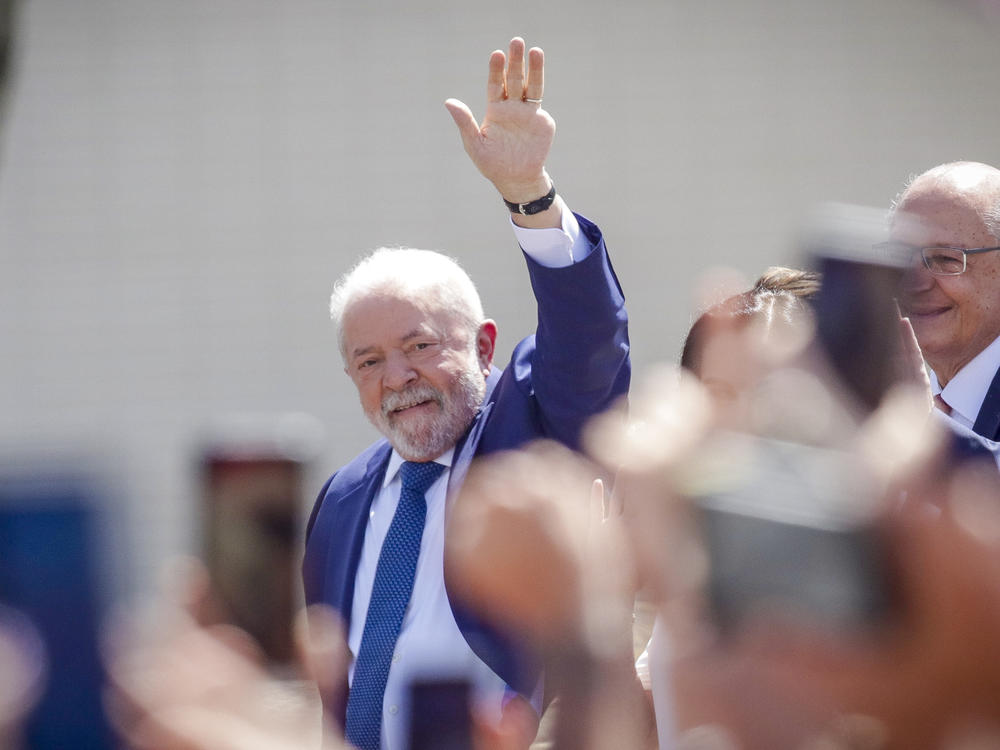Section Branding
Header Content
Leftist Lula da Silva is sworn in as president to lead a divided Brazil
Primary Content
Updated January 1, 2023 at 4:36 PM ET
Luiz Inácio Lula da Silva was sworn in as Brazil's president on Sunday in the capital of Brasilia to assume office for the third time.
The leftist narrowly beat far-right incumbent Jair Bolsonaro in an October runoff election, marking a stunning political comeback — just three years after da Silva was released from prison on corruption charges and 12 years after his first two terms as president.
Da Silva has promised a return to "normality," ushering in a major political shift in a highly polarized country. The 77-year-old defeated Bolsonaro in the Oct. 30 vote by less than 2%. Bolsonaro, a 67-year-old populist in the mold of former President Donald Trump, never conceded defeat and has propagated doubts about the legitimacy of Brazil's election.
Since then, Bolsonaro supporters have been defiantly camping out in front of army barracks around the country, calling for armed forces to intervene and overturn the election. On Christmas Eve, one Bolsonaro supporter was arrested in an alleged bombing attempt.
Bolsonaro himself left the country on Friday for Florida and it's unclear when he will return to Brazil. The incoming administration downplayed fears of a Jan. 6-style insurrection in the country.
Still, security was tight at the capital on inauguration day, as da Silva officials put on a show — a celebration they've dubbed "Lulapalooza" — drawing hundreds of thousands to gather for the ceremony, which included a concert with some of the country's biggest artists.
In his inaugural speech, Lula vowed to rebuild his country after what he said were four years of destructive right-wing politics. He condemned his predecessor's administration for committing "genocide" by failing to combat the COVID-19 pandemic. More than 600,000 Brazilians died from COVID, the world's second-highest death toll after the U.S. Da Silva also pledged to combat hunger and poverty, to protect the Amazon and to fortify Indigenous rights.
With Bolsonaro away, he did not pass on the presidential sash, as is tradition. Instead, da Silva received the honor from ordinary Brazilians, including an Indigenous leader, a man with cerebral palsy and a Black youth.
Da Silva faces no shortage of challenges
Da Silva, a former union leader known as a pragmatic negotiator, faces an uphill battle heading into another four-year term, especially with Bolsonaro's party having secured majority control of both chambers in Congress.
The progressive leader was previously implicated in a massive corruption scandal involving money laundering. He spent about a year and a half in prison before he was released in 2019 on a technicality; the country's Supreme Court later annulled his criminal conviction on grounds that the judge in the case was biased.
After serving his two terms from 2003 to 2010, da Silva is credited with helping millions of Brazilians escape poverty. Today, he's inheriting a struggling economy with rising poverty.
Copyright 2023 NPR. To see more, visit https://www.npr.org.

